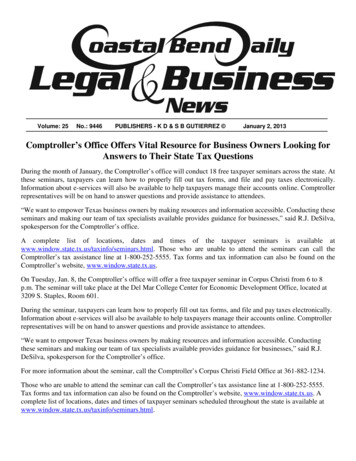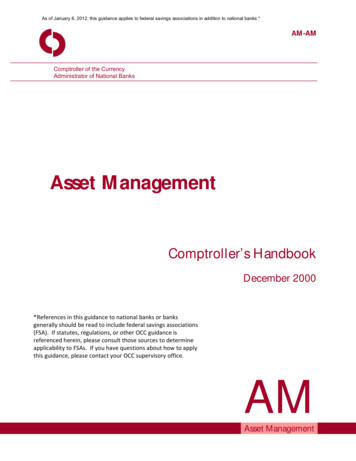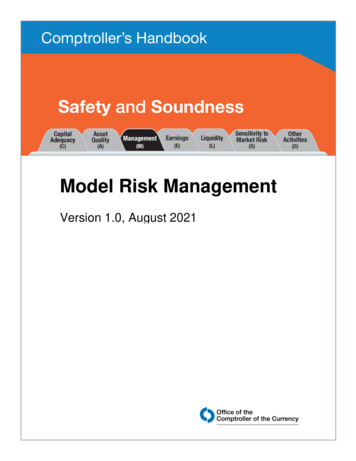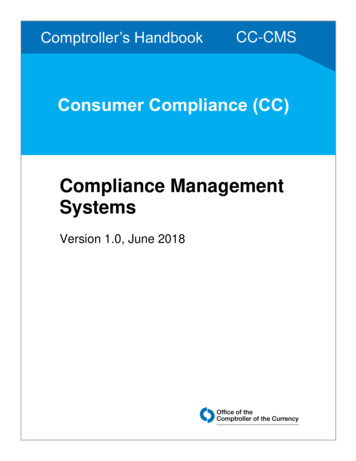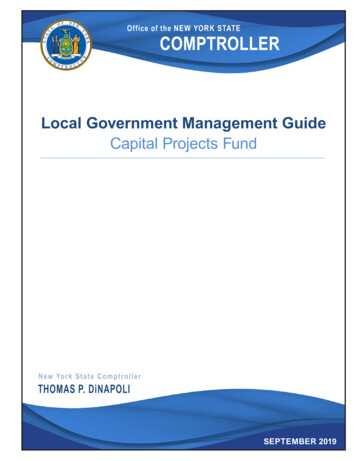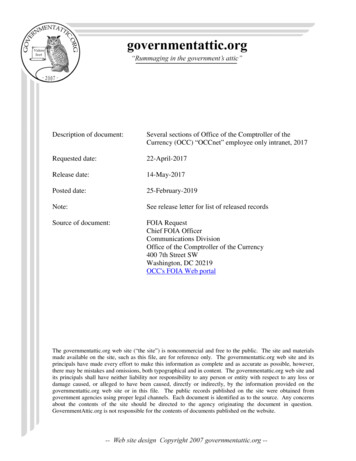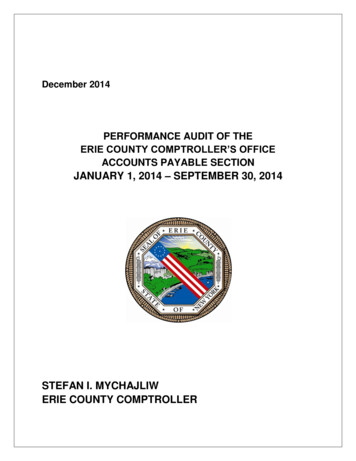
Transcription
COMPTROLLER’S LICENSING MANUALCHARTERSDECEMBER 2021
ContentsContents . iIntroduction .1Key Policies .3Organizing Group’s Role and Responsibilities . 6Sponsoring Organizations . 7Parallel-Owned Banking Organizations . 11Management and Directors’ Banking Experience . 12Insider Policy . 17Transactions With Insiders . 17Insider Personal and Financial Commitments . 18Insider Compensation . 18Regulatory Review . 19Accounting Considerations and Shareholder Disclosures . 22Organizers’ Business Plan . 22OCC Evaluation of Proposal. 23Capital Considerations . 25Assessment of Community Credit Needs . 30Compliance Issues . 31Digital Banking Considerations . 31Application Process .33Exploratory Calls or Meetings . 33Prefiling Meeting . 33Filing the Application . 34Review of the Application . 40Decision . 41Organization Phase . 43Post-Opening Considerations . 51Special Purpose Proposals . 52Procedures: Prefiling .66Exploratory Inquiry, Conference Call, or Meeting . 66Prefiling Meeting . 66Procedures: Application Process .67Filing the Application and Publication . 67OCC Field Investigation . 67Public Comments and Hearings . 68Decision . 68Procedures: Capitalizing the Bank.69Organizing Directors. 69Comptroller’s Licensing ManualiCharters
Contact Person . 70OCC District Counsel . 70Organizing Directors. 70Escrow Agent . 71Organizing Directors. 71OCC Legal Staff . 71Organizing Directors. 72Escrow Agent . 72CEO . 72OCC Licensing Staff . 72Escrow Agent . 72Procedures: Organization Phase .73Organizing the Bank . 73Meeting of Shareholders/Members and Directors . 75Organizing Bank Operations . 76Preopening Examination . 76Continuing to Organize Bank Operations . 77Chartering and Commencing Business . 77Appendix A: Directors’ Duties and Responsibilities, Qualifications, and Other Issues .79Duties and Responsibilities of Directors . 79Director Qualifications . 82Election of Directors . 83Vacancies on the Board . 84Depository Institution Management Interlocks Act. 84Potential Liability . 85Appendix B: Stock Benefit Plans .86Primary Types . 86Type 1 Plans. 86Type 2 Plans. 87Type 1 and Type 2 Plan Expectations . 87Management and Employee Stock Benefit Plans . 89Accounting for Employee Stock Options . 89Appendix C: Supervision and Oversight Highlights .90The Evaluation Process . 90Risk Assessment System . 90Risk Management . 91RAS and the CAMELS Rating System . 93Enhanced Supervision. 94Specialty Area Assessments . 95Enforcement Actions . 97Appendix D: Compliance Highlights .98Comptroller’s Licensing ManualiiCharters
Fair Lending Statutes . 98BSA/AML Provisions . 98Verification . 99Safeguarding Customer Information . 100Privacy . 101Advertising. 103Appendix E: Significant Deviations After Opening.104Purpose. 104Identification . 104Evaluation . 105Supervisory Actions and Communications. 106Glossary .107References .114Table of Updates Since Publication .127Comptroller’s Licensing ManualiiiCharters
IntroductionThis booklet of the Comptroller’s Licensing Manual provides guidance concerning thelicensing procedures of the Office of the Comptroller of the Currency (OCC) relating to thegranting of charters to national banks and federal savings associations (FSAs) (collectively,banks). 1 The requirements referred to in this guidance document reflect provisions in existingstatutes and regulations. The relevant statutes and regulations are listed at the end of thisbooklet or referenced as applicable throughout the document. 2Before establishing a national bank or an FSA, each organizing group must apply to, andobtain approval from, the OCC. New banks may be chartered for full-service or specialpurpose operations, such as trust banks, credit card banks, bankers’ banks, communitydevelopment (CD) banks, cash management banks, and other banks that limit their activities.Each organizer and proposed director are responsible for understanding the charteringprocess and the role of a bank director. Each organizer and proposed director should reviewthis booklet to become familiar with the chartering process.National banks and FSAs are chartered under different legal authorities. As such, laws,regulations and rulings applying to each charter are sometimes different, although many lawsand requirements apply to both charter types. The application process for both charters issimilar, but differences in the process or factors the OCC considers when reviewing charterapplications for the two charter types are highlighted in this booklet, as appropriate. Nationalbanking associations are owned by shareholders who own stock issued by the national bank.An FSA may also be organized as a stock entity (stock FSA) or may have a mutual form oforganization (mutual FSA), in which the equity interest in the FSA is attributed to the FSA’smembers (members generally include depositors, but also may include borrowers).Each bank is different and may present unique issues. Licensing, as a complement to theOCC’s supervisory activities, ensures that the corporate structure of banks is established andmaintained in accordance with principles of safety and soundness and consistent withapplicable laws and regulations. Accordingly, the OCC applies the guidance in this bookletconsistent with the supervisory goals for each bank. The bookletThis booklet also covers special purpose banks such as trust banks, credit card banks, and communitydevelopment banks, which may be subject to specific regulations or guidance, as described in the “BankSupervision Process” booklet of the Comptroller’s Handbook. For information on national trust banks and FSAtrust banks, refer to OCC Bulletin 2007-21, “Supervision of National Trust Banks, Revised Guidance: Capitaland Liquidity” (as of June 7, 2012, this guidance also applies to FSAs).12This booklet also may include procedures that filers must follow in connection with applications to charter abank. Such procedures are not substantive rules that establish decision criteria. Rather, they are steps that mustbe taken, in connection with the filing of an application, to allow the OCC to assess whether the substantiverequirements in existing statutes and regulations for granting a charter have been met. Consistent with theAdministrative Procedure Act, the OCC may issue guidance concerning licensing that contains bindingprocedural steps a bank must take to allow the OCC to assess a bank’s application or notice. See 5 USC553(b)(A).Comptroller’s Licensing Manual1Charters
describes OCC policies and procedures used in the charter application process, alongwith detailed guidance and instructions.discusses the factors that the OCC considers in deciding a proposed bank’s application.describes the application process, including the prefiling process, filing and review of theapplication, the decision, and the organization phase of the new bank.provides information about the ongoing supervision of a federally chartered bank andissues applicable to a special purpose bank.This booklet consists of an introduction, a key policies section outlining specific factors forchartering banks, a section on the application process, and a procedures section. A glossaryof terms used in the booklet is provided as well as a reference section with statutory andregulatory citations and other useful materials. References are also made to other booklets ofthe Comptroller’s Licensing Manual and the Comptroller’s Handbook.Throughout the electronic edition of this booklet are hyperlinks to sample documents on ourpublic website, such as the Interagency Charter and Federal Deposit Insurance Application(interagency application), and other information that a filer may find useful.Throughout this booklet, national banks and FSAs are collectively referred to as banks orfederally chartered banks, unless it is necessary to distinguish between the two types ofcharter.Comptroller’s Licensing Manual2Charters
Key PoliciesThe OCC grants approval of charter applications in two steps: preliminary approval and finalapproval. Preliminary approval is granted if the factors the OCC considers in reviewingcharter applications are favorable; this approval permits the organizers to proceed withorganizing the bank. Granting preliminary approval provides the organizers of the bank withassurances that the application has passed the first phase of OCC review before additionalfunds are expended to raise capital, hire officers and employees, and complete theorganization of the bank.The OCC defines the organization phase as the period between the preliminary approval andthe bank opening. Refer to the “Organization Phase” section of this booklet. During theorganization phase, the organizing bank’s officers and directors hire management and staff,continue or begin to raise capital, prepare bank premises, and develop policies andprocedures to guide the bank’s operations.Receipt of final approval from the OCC means the OCC has issued a charter for the bank,and the bank can begin to conduct banking business. By this point, the organizers must havecompleted all key phases of organizing the bank as determined by the OCC and received anyother necessary regulatory approvals, including Federal Deposit Insurance Corporation(FDIC) deposit insurance, if applicable.Capital must be raised 3 within 12 months of the OCC’s preliminary approval or the approvalexpires unless the OCC grants an extension. If the preliminary approval expires, then all thecash collected on any subscriptions for the bank’s stock must be returned. 4 Under certaincircumstances, capital can be raised before preliminary approval but after the proposed bankbecomes a legal entity. Refer to the “Raising Capital” section of this booklet.The bank must open within 18 months of the OCC’s preliminary approval or the approvalexpires unless the OCC grants an extension. 5 The bank may not conduct banking business orengage in fiduciary or other activities until the OCC grants final approval and issues acharter. 6In determining whether to approve an application to establish a national bank or FSA, theOCC is guided by the goal of maintaining a safe and sound banking system. The OCCapproves proposals to establish banks that have a reasonable chance of success, will providefair access to financial services by helping to meet the credit needs of its entire community (ifOrganizers seeking to charter a mutual FSA should consult with the appropriate OCC Licensing officeregarding capital raising efforts. Formations of mutual FSAs involve different challenges when raising capitalcompared with stock charters because mutual FSAs do not issue stock.34Refer to 12 CFR 5.20(i)(6)(iv).5Refer to 12 CFR 5.20(i)(6)(iv).6Refer to 12 CFR 5.20(i)(6)(ii)(B).Comptroller’s Licensing Manual3Charters
the bank will extend credit), will ensure compliance with laws and regulations, will promotefair treatment of customers including efficiency and better service, and foster healthycompetition. OCC approval does not assure that operating a bank is without risk to theorganizers or the investors. In reaching its decision, the OCC considers 7 whether theproposed bank has organizers who are familiar with applicable federal banking laws and regulations.has competent management, including a board of directors, with the ability andexperience relevant to the type of products and services to be provided.provides for sufficient capital in relation to the proposed business plan.can reasonably be expected to achieve and maintain profitability.will be operated in a safe and sound manner.does not have a title that misrepresents the nature of the institution or the types ofservices it offers.poses acceptable risk to the Federal Deposit Insurance Fund, if applicable.demonstrates that its corporate powers are consistent with the purposes of the FederalDeposit Insurance Act (FDIA), the National Bank Act, and the Home Owners’ Loan Act(HOLA) (12 USC 1464), as applicable.In addition, the OCC considers a proposed bank’s plans for meeting the credit needs of itscommunity, including low- and moderate-income (LMI) neighborhoods, consistent with thesafe and sound operation of the bank as required by the Community Reinvestment Act(CRA). 8The OCC considers the following additional factors 9 in reviewing an application to charteran FSA, as required by HOLA: 7A charter for an FSA may be granted only to persons of good character andresponsibility.In the judgment of the OCC, a necessity exists for such an institution in the community tobe served.There is a reasonable probability of the FSA’s usefulness and success.The FSA can be established without undue injury to properly conducted existing localthrift and home financing institutions.Refer to 12 CFR 5.20(e) and (f), which outline factors the OCC considers in reviewing a charter application.CRA requires the OCC to take into account a proposed insured bank’s description of how it will meet its CRAobjectives. Refer to 12 USC 2903(a)(2) and 12 CFR 5.20(e)(2). This requirement does not apply to proposedspecial purpose banks that will not perform commercial or retail banking services by granting credit to thepublic in the ordinary course of business, other than as incidental to their specialized operations. These specialpurpose banks include banker’s banks, as defined in 12 USC 24(Seventh), and banks that engage in one or moreof the following activities: providing cash management-controlled disbursement services or serving ascorrespondent banks, trust companies, or clearing agents. Refer to 12 CFR 25.11(c)(3).89Refer to 12 CFR 5.20(e)(1)(ii).Comptroller’s Licensing Manual4Charters
Further, the OCC considers whether a proposed FSA will be operated as a qualified thriftlender under 12 USC 1467a(m), and that lending and investment activities will be within theHOLA limits, or the bank otherwise qualifies under this section.The OCC may deny an application, as specified in 12 CFR 5.13(b), based on any of thefollowing factors: Significant supervisory, CRA (if applicable), or compliance concerns exist with respectto the filer.Approval of the filing is inconsistent with applicable law, regulation, or OCC policy.The filer failed to provide information requested by the OCC that is necessary for theOCC to make an informed decision.Each charter application must include accurate statements and fully developed businessplans, and it must demonstrate that the organizers (and any sponsoring companies) are awareof and understand the laws, regulations, and safe and sound banking practices that wouldapply to the bank’s operation. 10The OCC encourages each organizing group interested in establishing a bank to contact theOCC for information about the process and guidance about specific issues unique to thegroup’s proposal. The OCC normally requires all the organizers of a bank and the proposedchief executive officer (CEO) to attend a prefiling meeting before filing the application.Certain aspects of a bank’s business plan may require additional filings with the OCC, oradditional information in the charter application. For example, if the organizers propose forthe bank to exercise fiduciary powers, the charter application should include all relevantinformation normally filed with an application for fiduciary powers. Similarly, if the newbank proposes branch locations, separate branch applications are required, with separaterequirements for public notice. Organizers should contact the OCC for guidance concerningadditional filings that may be required.The organizing group should file an interagency application for deposit insurance with theFDIC when it submits its charter application to the OCC, if the proposed bank will offerinsured deposits. All FSAs must be FDIC-insured. 11A bank holding company (BHC) or savings and loan holding company (SLHC), or acompany that would become a BHC or SLHC because of its ownership of a proposed bank,must obtain approval from the Board of Governors of the Federal Reserve System (Federal10Refer to 12 CFR 5.20(h)(6).11Refer to 12 CFR 5.20(e)(3).Comptroller’s Licensing Manual5Charters
Reserve Board) to acquire a newly established bank before the OCC will grant finalapproval. 12Organizing Group’s Role and ResponsibilitiesA strong organizing group generally includes persons with diverse business and financialinterests and community involvement. The business plan and other information supplied inthe application must demonstrate an organizing group’s collective ability to establish andoperate a successful bank in the economic and competitive conditions of the market the bankwill serve. 13 A poor business plan reflects adversely on the organizing group’s ability, andthe OCC may deny such applications. 14The organizing group must be composed of five or more natural persons. 15 Normally, all theorganizers serve as the bank’s initial board of directors.The organizers should ensure that the organizing group consists of persons with diverse business andfinancial interests and community involvement and includes persons with experience,competence, willingness, and ability to be active in directing the proposed institution’saffairs in a safe and sound manner. 16must have a personal history that reflects responsibility, honesty, and integrity. 17for directors’ stock purchases or capital contributions, the purchases or contributionsindividually and in the aggregate, should reflect a financial commitment to the success ofthe institution that is reasonable in relation to their individual and collective financialstrength. 18must select a capable CEO and, early in the organization process, other competent seniorexecutive officers who have the necessary experience to successfully implement theproposed business plan and enhance the proposed bank’s likelihood of success. 19must develop a business plan thatThere are exceptions to this requirement under the Bank Holding Company Act for certain national trustbanks or national credit card banks. These exceptions are discussed in the “Special Purpose Banks” section ofthis booklet.1213Refer to 12 CFR 5.20(g)(1).14Refer to 12 CFR 5.20(g)(1).15Refer to 12 CFR 5.20(d)(8), and, for national banks, 12 USC 21.16Refer to 12 CFR 5.20(g)(1).17Refer to 12 CFR 5.20(g)(3)(i).18Refer to 12 CFR 5.20(g)(3)(i).19Refer to 12 CFR 5.20(g)(2).Comptroller’s Licensing Manual6Charters
demonstrates the group’s collective ability to establish and operate a successful bankin the economic and competitive conditions of the market to be served. 20 articulates the risks of the proposed operation and the policies, processes, personnel,and control systems that the bank will use to monitor and control those risks.should understand their role in the successful implementation of the business plan.should design executive officer and other compensation proposals that are consistent withthe OCC’s guidelines. Refer to the “Insider Compensation” section of this booklet.The organizing group must designate a contact person to represent the organizing group in allcontacts with the OCC. The contact person must be an organizer and proposed director of thenew national bank or FSA, except a representative of the sponsor or sponsors may serve ascontact person if an application is sponsored by an existing holding company, individualscurrently affiliated with other depository institutions, or individuals who, in the OCC’s view,are otherwise collectively experienced in banking and have demonstrated the ability to worktogether effectively. 21Sponsoring OrganizationsA new bank may be affiliated with another organization, also called a sponsor, rather thanchoosing to operate independently. A sponsor usually is an existing corporation or holdingcompany, including a BHC or SLHC. If the new bank is affiliated with an existingcorporation or holding company, the OCC may consider the existing organization to be thesponsor of the new bank. The OCC looks closely at the proposed relationships between thebank and other organization(s) within the sponsor to determine whether to permit theaffiliation.The OCC does not consider as a sponsor a new BHC, SLHC, or other holding companyestablished at the same time as a new bank. Such a new parent company generally does notoffer significant financial and managerial resources to support the bank’s operations. Inaddition, a new holding company generally has few activities separate from those of thebank.A sponsor may also be a group of individuals who are currently affiliated with otherdepository institutions, or individuals who, in the OCC’s view, are otherwise collectivelyexperienced in banking and have demonstrated the ability to work together.A representative of the sponsor or sponsors may serve as the contact person with the OCC.20Refer to 12 CFR 5.20(g)(1).Refer to 12 CFR 5.20(i)(4). There is an exception for banks that are sponsored by a qualifying holdingcompany. Refer to the “Sponsoring Organizations” section of this booklet.21Comptroller’s Licensing Manual7Charters
regulations and rulings applying to each charter are sometimes different, although many laws and requirements apply to both charter types. The application process for both charters is . provides for sufficient capital in relation to the proposed business plan. can reasonably be expected to achieve and maintain profitability.


